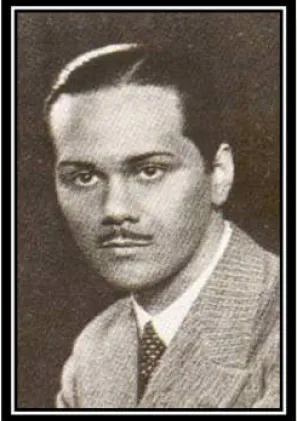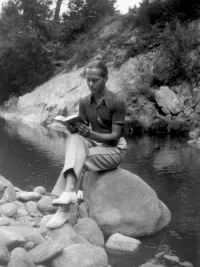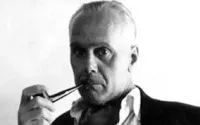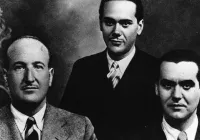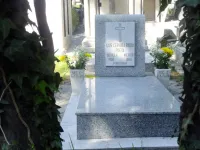Biography
1902 - 1963
“Everything beautiful has its moment and then passes away.”
– Luis Cernuda
Born and educated in Seville, he studied law before deciding to pursue a career in literature. Cernuda was one of the iconoclastic, antibourgeois poets who became famous in Spain as the “Generation of `27.” He embraced his homosexuality at an early age and was the first widely read Spanish-language poet to express homoeroticism openly and positively. As the title of his 1936 collection of poems – La Relialidad y el Deseo (Reality and Desire) – suggests, one of his most important themes was the conflict between the repressive society in which he lived and his own solitary, unsatisfied longings. Expanded on almost until his death in 1963, the ground-breaking collection explored desire, love, subject, object, history and sexuality in poems that reveal influences from romanticism, classicism, and the surrealist avant-garde. Cernuda collaborated with many organizations working to support a more liberal and tolerant Spain, participating in the Second Congress of Anti-Fascist Intellectuals in Valencia. After fleeing the Spanish Civil War in the late 1930s, he supported himself with odd jobs and translations, living in England, the U.S. and, for the last decade of his life, Mexico City, where he died in November of 1963. He has since come to be recognized as a major 20th-century Spanish-language poet.
1902 - 1963
“Everything beautiful has its moment and then passes away.”
– Luis Cernuda
Born and educated in Seville, he studied law before deciding to pursue a career in literature. Cernuda was one of the iconoclastic, antibourgeois poets who became famous in Spain as the “Generation of `27.” He embraced his homosexuality at an early age and was the first widely read Spanish-language poet to express homoeroticism openly and positively. As the title of his 1936 collection of poems – La Relialidad y el Deseo (Reality and Desire) – suggests, one of his most important themes was the conflict between the repressive society in which he lived and his own solitary, unsatisfied longings. Expanded on almost until his death in 1963, the ground-breaking collection explored desire, love, subject, object, history and sexuality in poems that reveal influences from romanticism, classicism, and the surrealist avant-garde. Cernuda collaborated with many organizations working to support a more liberal and tolerant Spain, participating in the Second Congress of Anti-Fascist Intellectuals in Valencia. After fleeing the Spanish Civil War in the late 1930s, he supported himself with odd jobs and translations, living in England, the U.S. and, for the last decade of his life, Mexico City, where he died in November of 1963. He has since come to be recognized as a major 20th-century Spanish-language poet.
Demography
Demography
Gender Male
Sexual Orientation Gay
Gender Identity Cisgender
Ethnicity Latinx
Nations Affiliated Spain United Kingdom United States Mexico
Era/Epoch Interwar Period (1918-1939) Roaring Twenties (1920-1929)
Field(s) of Contribution
Academics
Author
Lecturer
Military
Radio
Commemorations & Honors
Generation of 1927 Member
Posthumous Lambda Literary Award For Gay Men's Poetry For Written in Water (2004)
Demography
Gender Male
Sexual Orientation Gay
Gender Identity Cisgender
Ethnicity Latinx
Nations Affiliated Spain United Kingdom United States Mexico
Era/Epoch Interwar Period (1918-1939) Roaring Twenties (1920-1929)
Field(s) of Contribution
Academics
Author
Lecturer
Military
Radio
Commemorations & Honors
Generation of 1927 Member
Posthumous Lambda Literary Award For Gay Men's Poetry For Written in Water (2004)
Resources
Resources
https://en.wikipedia.org/wiki/Luis_Cernuda
https://www.britannica.com/biography/Luis-Cernuda
https://www.encyclopedia.com/arts/encyclopedias-almanacs-transcripts-and-maps/cernuda-luis
https://core.ac.uk/download/pdf/1154259.pdf
https://newyorkperistalsis.wordpress.com/2013/03/09/rediscovering-luis-cernuda-1902-1963/
Resources
https://en.wikipedia.org/wiki/Luis_Cernuda
https://www.britannica.com/biography/Luis-Cernuda
https://www.encyclopedia.com/arts/encyclopedias-almanacs-transcripts-and-maps/cernuda-luis
https://core.ac.uk/download/pdf/1154259.pdf
https://newyorkperistalsis.wordpress.com/2013/03/09/rediscovering-luis-cernuda-1902-1963/
